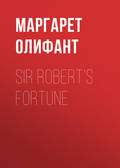
Маргарет Олифант
Merkland: or, Self Sacrifice
CHAPTER IX
ANNE Ross was seated near Mrs. Catherine’s piano when Alice Aytoun took her place at it timidly, and placing a sheet of manuscript music before her, began her song. Anne started in tremulous wonder as it commenced. Most strange to hear these words repeated by a living voice at all – stranger still that they should fall from Alice Aytoun’s. With breathless interest she listened as the lines flowed on. The wayfaring man in toil, and danger, and sorrow, hearing in the ripple of the great sea, far away in some strange country, the kindly call of the Oran to home and kindred. Her cheeks grew pale – her lips quivered. How could this be twined into Norman’s history? – or was Alice unconsciously murmuring out the low, sad prayer of its conclusion for her father’s murderer?
The tears were swelling in Anne’s eyes as the song concluded; and Ralph Falconer who stood near had addressed to her some sneering compliment on her sensibility, when Jacky stole behind her chair, and whispered something in her ear. Anne recollected herself instantly, and, approaching Mrs. Catherine, communicated to her Jacky’s intelligence. Mrs. Catherine started – rose from her seat – wavered a moment, and then restraining her emotions, sat resolutely down again.
“See, Anne, there is the key of the little room. Take the dyvour there – I will come myself when I can. Tell him that – .” Anne turned to obey. “And, child, – bid Euphan Morison have a good fire kindled in the red room, and tell Andrew he is to hold himself ready to wait on Mr. Archibald – and, child – be kindly to the unhappy youth. It behoves me to be stern myself, but there is no such bondage upon you.”
When Archibald Sutherland lifted his head it was Anne Ross who stood before him, her eyes shining wet, her face full of sympathetic sorrow. She held out her hand, and advanced towards him.
“Mr. Sutherland – Archibald.”
“Anne!” said the broken man. They shook hands; there needed no more speech; perfect and cordial sympathy, of no exaggerated sort, but such as does sometimes, and should always subsist between those who have passed childhood and early youth together, was between them in a moment. There was no story told – no compassion claimed; but, in the pressure of Anne’s hand, and the subdued kindness of her look, the full heart felt itself eased, and leaned upon the unexpressed sympathy as with the confidence of nearest kindred. There were no words; but Anne knew how Archibald’s spirit was wading like the moon in clouds and darkness; and Archibald felt that Anne, in the confidence of ancient kindness, was ready to hope and believe all things for his final deliverance and welfare.
“You will not go in,” said Anne, gently. “There is a large party, and some strangers.”
“No – no,” said Archibald. “I regret now that I came at all to-night. I would be a strange spectre, disturbing your merrymaking, Anne.”
“Merrymaking! With some of us, at least, there is not much of that,” said Anne. “Lewis is home, Archibald; you must see him. But now will you come with me to the little room? Mrs. Catherine will come herself immediately.”
“To the little room?”
“Yes; the house is full, and all the other apartments are occupied,” said Anne; “that is all. Mrs. Catherine has been looking for you, Archibald.”
They left the room together, and, to the great wonder of the congregated listeners in the hall, descended the stair, and turned through a dark passage to Mrs. Catherine’s place of especial retirement – the little room. Archibald entered, and Anne, leaving him, hastened to Mrs. Euphan Morison’s apartment, to convey to her Mrs. Catherine’s orders, in immediate execution of which a reluctant maid was hurried up stairs.
And Archibald Sutherland seated himself alone, fearing the interview which Mrs. Catherine made still more important and solemn by ordaining that it should take place there. The firm, dark face of Sholto Douglas looked down upon him from the wall, and fascinated his restless eyes. There seemed a lofty purity of reproof in those fine lineaments, over which the pallor of death had fallen, before Mrs. Catherine’s only brother had told out an equal number of years with himself. Sholto Douglas, in his early prime of manhood, laid in a foreign grave, the odor of a stainless name, and strong faith, numbering him among those just, who shall be held in everlasting remembrance. Archibald Sutherland, in the wreck of hope and fortune, and good fame, preserving barely life. Ah! who would not rather have chosen the solitary grave in far Madeira, in which all sin and uncertainty lay dead, and where, above flowery sod, and gray headstone, there blossomed one sublime and stedfast hope, as sure and true as heaven.
Archibald could not bear, what seemed the cold reproving scrutiny of that noble pictured face, and laying his arms upon the table, he bent down his head upon them. He fancied he could hear the music and gay voices still. Anne had left him. Mrs. Catherine lingered in her coming; even in this household, the only one in the cold world around him, in which he thought himself secure of welcome, the ruined man was nothing; bitter thoughts swelled up within his worn and wearied spirit, despair came back like a flood upon his heart; exhausted in health, broken in mind, disgraced in name – what remained for the once joyous heir of Strathoran, but poverty, neglect, and death.
Large gray eyes, made larger by the dew that swelled beneath their lids, were looking on him, as thus he sank further and further, into that horror of great darkness. Mrs. Catherine, whose slow step he had not heard approaching, in the tumult of his own thoughts, stood by him silently; her strong features moved by the contest between severity and tenderness.
“Archibald Sutherland,” she said, harshly. The young man started, but did not lift his head. “Archie, my man!” Her large hand was upon his hair, stroking it softly, as if the head it covered had been a child’s. He looked up. “You have sinned against your own spirit, and in the sight of God; but you are home in your own country, and under a kindly roof. Archie Sutherland, give me your hand, and let bygones be bygones between us.”
There was a silence of some minutes, during which, Mrs. Catherine grasped Archibald’s trembling hand in one of her’s, and with the other, smoothed down his dark hair, wet as it was, with the cold dew of mental pain. “Archie!” she repeated, “there have many waves passed over your head since I laid my hand upon it last; waves of sorrow and shame, and waves of sin, Archie Sutherland – but yet – be silent, and listen to me – yet I pray, as I prayed when we parted, that the blessing of the God of our fathers may be about you, boy, at this time, and for ever! Look up, and hear me. Let trouble, and toil, and hardship come, as the Lord will; lift up your head in His presence, Archie Sutherland, and plight me your word, that in your further warfare, manfully and honestly, and in the strength of His name, ye will resist sin. I fear no other thing in this earth, be it the sorest pain that ever wrung mortal flesh; but with a deadly fear do I tremble for that! That you will strive against it night and day, that you will give place to it – no, not for an hour – that wherever ye may be, in joy, or in tribulation, in peace, or in strife – ye will remember the One name whereby we can be saved, and resist iniquity, if need be unto blood. Your word, Archie Sutherland, I am waiting for your word.”
And solemnly, with lifted hand, and tremulous voice, the word was plighted. “With all the strength of a sad man, honestly, and in truth. Remembering the One name whereby we can be saved, and in the strength of Him who has overcome sin. God succor me!”
The flush faded from his thin cheek, his hand fell. Mrs. Catherine stood still by his side, in the same attitude, her hand lying fondly upon his hair, and there was again an interval of silence. “The angel that redeemed me from all evil, bless the lad. Archie, be of good cheer. Who kens the ways of the Lord? We are tried, but we are not forsaken.”
Mrs. Catherine seated herself opposite him, and looked into his face. “You are white and thin, Archie, spent with that weary trouble – and you have been walking upon the damp road in the night air, like an imprudent lad, as you are, and will have wet feet, doubtless. Go up to your room like a good heart, and change them, and then, Archie, my man, we are all friends together. Come in, and see Lewis Ross, and the rest of them, for I have a houseful to-night.”
“I am not fit for any company,” said the young man. “I should go in among them like a ghost. Mrs. Catherine, I have obeyed you to the letter. Last night, I saw my father’s house in the possession of strangers. Last night, I saw that man in my father’s seat. I have not shrunk from the full trial, and now there is no probation so hard, no struggle so bitter, but I am willing to embrace it, if I may but have a prospect of redeeming what I have sinfully lost; although it be only to die when all is done, beneath the roof where my fathers have lived and died before me.”
A sympathetic light kindled in Mrs. Catherine’s eye; but the wasted young man beside her, needed soothing and rest, as she saw, and after her own fashion she comforted him. “Archie, I am in years, and there is no wish so near my heart, as to see your work done before I go hence; but to do your work you must be strong, and to be strong, ye must rest; this is no a time to speak of dying. I ken no man in this world, that has a chain to life as strong as you have yourself, Archie Sutherland, if it be the Lord’s will, and truly, I have little hope of a man, with a labor before him, turning to death for ease and idleness. I doubt not, there are many years before you yet, blyther than these; but we will have time to speak of that hereafter. Go up to your room, Archie. It will mind ye of your school days, to have Andrew about you again, and come down when you are ready, to the little east room to me. You must even be a good bairn, and do my bidding to-night.”
Mrs. Catherine rose. Archibald rose too, in obedience. The strong old lady took the arm of the weak and exhausted young man, and half supporting him, went with him herself to the door of the red-room, where a cheerful fire was shining upon the warm color of curtains and furniture, while Andrew, with his grey hair dressed, and his best livery donned, in honor of the company, stood waiting at the door: the same room, with all its arrangements perfectly unchanged! the same friendly and well-known face, that had been wont to hover about him in kindly attendance in those joyous boyish days! The prodigal had returned home – the despairing man had entered into an atmosphere rich and warm with hope. Archibald threw himself into the old fire-side chair, and hid his face again in his hands, overpowered with a momentary weakness, from whose tears the strength of steadfast resolution and grateful purpose sprang up boldly, rising over bitterness and ruin and grief in sober triumph, the beginning of better days.
But Archibald did not make his appearance in Mrs. Catherine’s drawing-room that night. With the shame of his downfall strong upon him, and feeling so bitterly the disruption of all the ties which formerly bound him in kindly neighborship to these prosperous people, who knew his fall and humiliation alone, and did not know his painful struggles and sore repentance, he shrank from meeting them; and when, having entered the little east-room, he told Mrs. Catherine what pain her kind wish to cheer him would inflict upon him, she did not repeat her commands.
“But I will meet ye half-way, Archie,” she said, “Robert Ferguson, your good friend and honorable steward is laboring at this time redding up the tangled odds and ends of your affairs, and it is meet you should see him and render him right thanks for his good service. You ought to have gone to Woodsmuir first. I know not any mortal you are so much indebted to. Go your ways to the library and shut the door – I will send over for Mr. Ferguson. Na – you shall not stir over my door in a damp night till you have won back your strength again – and Mr. Foreman is here, Archie; would you like me to send him down? or are you able to stand it?”
“Quite able,” said Archibald, hastily. “Ask Mr. Foreman to come to me, Mrs. Catherine. With all your kindness, I yet cannot rest till I see something definite before me. I have lost too much time already, and Mr. Foreman is an old and kind friend. I do not deserve so many. Let him come to me, if, indeed, he will come – I need counsel sorely.”
Mrs. Catherine made a gesture of impatience. “And I am trysted with these young fools, and cannot win down beside you to put in my word. Mr. Foreman will come blythely, Archie – go your ways, and be careful of shutting the door, that you may not be disturbed. Andrew, let Johnnie Halflin ride to Woodsmuir without a moment’s delay. If he tarries on the road, it will be at his peril; and give my compliments to Mr. Ferguson – or stay – Archie, write a word yourself.”
Established in the library, Archibald wrote a hasty note to Mr. Ferguson, and in a moment after heard Johnnie Halflin, with many arguments, persuading an unwilling pony to face the damp, chill blast, which swept so mournfully through the naked woods, and over the sighing Oran, and at last gallopping off on the road to Woodsmuir, the footsteps of his shaggy little steed sounding in unsteady leaps, as it struggled to turn its head from the wind, and regain its comfortable stable.
Various groups in Mrs. Catherine’s drawing room were whispering already reasons for her absence.
“I am afraid, Mrs. Catherine is not well,” said Mrs. Coulter, sympathetically. “Her face has had a look of trouble all the night.”
“Perhaps it is some unpleasant visitor,” suggested Mr. Bairnsfather. “I thought she was agitated.”
“Mrs. Catherine agitated,” cried Walter Foreman, “you might as soon shake the Tower.”
“Hold your peace, Sir,” said his father. “These young men are constantly speaking of things they don’t comprehend. Mrs. Catherine feels much more deeply than you will ever do.”
Walter looked up amazed. His father’s eyes were uneasily fixed upon the door; his face anxious and full of care.
“Ay,” said Mrs. Bairnsfather, shaking her head pathetically, “it has been a great grief to her this downcome of young Strathoran. A fine life he led in Paris, by all accounts; he will surely never come home, to be a burden on Mrs. Catherine.”
Mr. Foreman turned round impatiently, as if to answer, but evidently checking with some difficulty an angry reply, looked again towards the door.
“Poor Archibald,” said the kindly Mrs. Coulter, “this is not a time for his friends to desert him. Dear me, there is Mr. Ambler persuading Jeanie to sing. Jeanie, my dear, mind what a cold you have got.”
“Just, ‘Auld Robin Gray,’ for the benefit of the seniors,” said Mr. Ambler, “the first notes will call Mrs. Catherine back again.”
Jeanie Coulter seated herself at the piano, Walter Foreman took his place behind her. The “seniors” prepared to listen – the younger part of the company to whisper and exchange smiles and glances, the long ballad being too much for their patience.
“Do you think it can be young Strathoran who has arrived?” whispered Mrs. Bairnsfather.
Mrs. Coulter nodded impatiently, resenting the interruption of Jeanie’s song.
“Not that new fangled nonsense, Jeanie my dear,” said Mrs. Catherine, entering. “You ken the tune Lady Anne wrote it for – a right breath to carry forth the story on – not that – as if sick hearts were like to play with a melody, and did not just seek the needful breath of music to send forth their sorrows withal.”
“You knew Lady Anne, Mrs. Catherine?” said Jeanie Coulter, playing with the keys, and finding this a proper opportunity for the hesitation and coyness necessary to set off her pretty voice and tasteful singing.
“Ay, I knew Lady Anne – you all ken that; sing your ballad, Jeanie Coulter, and do not keep us waiting. Mr. Foreman, I have a word to say to you.”
The word was said. Mr. Foreman in haste, and not without agitation, left the room, and Mrs. Catherine herself stood near the piano listening to the music. Jeanie Coulter did the ballad – than which it seems to us, there is no history of more perfect beauty and pathos in all the stores of our Scottish tongue, rich though it be in such – full justice. The tremulous sad music stole through the room, arresting even Alice, though she was rising then nearly to the climax of her girlish happiness – ”I wish I were dead, but I’m no like to dee.” What strange avalanche of trouble could ever bring such words as these from Alice Aytoun’s lips? It was impossible.
Yet under that same roof was one, whose youthful beginning had been more prosperous than Alice Aytoun’s, schooling himself to patience, as again and again the pain of his past transgressions came back upon him like a flood. Agent and factor had both taken their place beside him in the library – the lamp shone upon the somewhat sharp profile of Mr. Foreman, with its deepset acute eyes and deliberative look – upon the healthful, hardy, honest face of Mr. Ferguson, browned by exposure, and instinct with earnest sympathy and kindness – and upon Archibald Sutherland’s wan and downcast countenance, with its mark of past sickness, and present melancholy humility; they were discussing his future career.
“I will tell you what I propose for myself, Mr. Archibald,” said Mr. Ferguson, “My occupation is gone, as you know, in respect to the estate of Strathoran. Now there is Loelyin and Lochend the entailed lands – you will remember that Alexander Semple is in them, and there are three years of his lease to run; but Semple has little capital and no enterprise, and I think would be glad to get rid of his lease and try a more productive farm. It is poor land.”
Archibald looked up vaguely, not seeing what the factor’s remarks tended to:
“The land is poor but improvable,” continued Mr. Ferguson; “and the farm of Woodsmuir, which I have occupied myself, is in excellent condition. I believe that with capital and perseverance, the value of these entailed lands might be more than doubled, and Mr. Coulter, a practical man of high authority, bears me out.”
Archibald shook his head sadly:
“We have no capital, Mr. Ferguson.”
“We have thought of that,” said Mr. Ferguson; “but your friends – Mrs. Catherine for example – have, and this would be no temporary relief, but a certain benefit.”
“I see,” said Archibald; “and yet it is impossible. My most kind friends, do not think it is pride – of all things there is none that would become me worse than that; but I am quite unfit for this trial. I question if now, with my mind excited and unsettled as it has been, I could endure the placid routine of a farmer’s life anywhere. I have rather been looking forward to unceasing labor of a more engrossing kind, as the only wholesome discipline for me; but here it is impossible – to live within sight of Strathoran, to reap the bitter fruits of my folly day by day, without intermission, upon my own alienated land – it would kill me – I could not do it, I could do anything but that.”
The factor had been waiting eagerly, with his hand lifted. – ”Certainly not – surely not – we never could think of such a thing, Mr. Archibald. You must hear out my plan. What I propose is, that I, who have some knowledge of agriculture, and a taste for it, should take these farms into my own hand. I have consulted Mr. Coulter, and I will have the full benefit of his advice; and I am confident of Mrs. Catherine’s assistance. In such an investment, capital is perfectly secure, and subject to no vicissitudes – very few, at least; and I fully believe, that, carefully and scientifically cultivated, we may quadruple the poor two hundred a year it yields now: so that, in addition to your own success, which I have no doubt is certain, if you throw your whole strength into any profession, there will be, in not very many years, a property of seven or eight hundred a year waiting for you. The original property, Mr. Archibald, with opportunity of adding to it, perhaps, bit by bit, from the rest of the estate – ”
Archibald Sutherland extended his hand silently, and grasped his factor’s. “My punishment is to be overpowered with undeserved kindness,” he said, his voice trembling. “My obligations to you already transcend thanks, Mr. Ferguson, and yet you increase them.”
Mr. Ferguson resumed his statement hastily, as if ashamed of the emotion which wet his own eyes, and brought a kindred tremor to his voice. “I have grown grey in the district, Mr. Archibald, and would like ill to leave it now. My whole family were born in Woodsmuir. I have long been a theoretical farmer, you know; and now I will get some of my favorite crotchets put into practice. We shall come into collision Mr. Coulter and I,” continued the factor, with a kind of hysterical attempt at a joke, which broke down woefully; “but we will, at least, have a fair field for our respective hobbies; and the prospect of so great an increase, Mr. Archibald, is worth working for.”
“Yes, to the worker,” said Archibald; “but what justice can there be Mr. Ferguson, in you devoting years to increase my income? The fruit of your improvements is clearly your own – not mine.”
“There! there!” said Mr. Foreman, breaking in impatiently. – ”The fact is, Ferguson, that you should have just put in your proposal without any preface to make it hazy. Mr. Ferguson takes Alexander Semple’s place, at Alexander Semple’s rent, Mr. Sutherland – that’s his proposal – continues so, till his improvements are fairly and honestly paying, and then remains your tenant at the advanced rent: we will see that he does not offer you too little. As for the capital, that is our concern; I will undertake that.”
Archibald Sutherland said some incoherent words of thanks, he did not himself know what – neither did his hearers, as Mr. Ferguson shook his grey eye-lash free of some encumbering moisture, and Mr. Foreman coughed, and cleared his throat. There was a brief pause.
“And for yourself, Mr. Archibald?” said the lawyer.
“For myself, I do not know. I have formed no definite plan. Give me your counsel: I am ready to do anything.”
“The bar?” suggested Mr. Foreman.
“Medicine?” ventured the factor.
Archibald shook his head. “I am no longer a youth, and could ill spare years now for study. Do you know what a great work I am pledged to Mr. Foreman? No less than winning back what I have lost, and doing it in Mrs. Catherine’s lifetime. You smile. It looks like a sick fancy, does it not? – yet it is a fancy that stirs me in every vein. I must work, gentlemen – I must work; how hardly I do not care; work for mere mercenary gain. I shall not gain honor with my schoolfellow Robert, Mr. Ferguson; that is beyond my reach. I must toil to the utmost of my strength to regain my birthright. I can afford to lose no time.”
Mr. Foreman had smiled gravely when Archibald began, but the smile settled down into a look of earnest attention before he concluded. He thought the hope futile, no doubt; but it was a hope: and his was not the hand to snatch it rudely from the grasp of a fallen man.
“Business?” said Mr. Ferguson, half aloud. “He must be embarked in business – but how?”
“Listen to me,” said Archibald, becoming stronger, as it seemed, when his own fate came under discussion. “My friends, I must go abroad; I can neither rest nor work well at home – at this time, at least. Let me go alone, as humbly as may be. I will put myself under mercantile training at first, if you think it necessary. My own idea is – I have some poor pride, perhaps, in letting you see that I am not too proud for my fallen fortunes – that I should get a clerk’s situation in some commercial house abroad – I do not care where – and work my way upward, as I can. I have no money; and what bare influence I could command, would help me little, I fancy. Let me make this experiment, with no adventitious help of patronage or introduction. If I fail, I will promise to return upon your hands again, trusting that your kindness will counsel the unhappy waif once more; but I hope not to fail. All the details remain to be considered. – When or how I am to endeavor to begin, I have not thought; and for whatever your kindness and better knowledge can suggest, I am in your hands.”
Neither of his grave counsellors spoke for some minutes; at last, Mr. Foreman said: “You are right, Mr. Archibald. I thought of that myself, formerly, but imagined foolishly, that you would shrink from trade. Your resolution is proper and wise; but remember – I do not wish to discourage you, but there are only a very few, who rise from the class of clerks into that of merchant princes. We are apt, in these days, to form mercantile romances for ourselves; there are some very wonderful instances, I grant, but they are rare.”
“As in all other professions,” said Mr. Ferguson, watching the changes of Archibald’s face anxiously; “but talent and vigor still more rarely remain in the humblest class. You are wearied, Mr. Archibald; let us adjourn this discussion. We can meet in Portoran in a day or two, if you are able,” continued the factor, turning with all the solicitude of a nurse to his late patient, “if you are sure you are able.”
And with that agreement, Archibald, indeed thoroughly exhausted and worn out, parted with his kind advisers and retired to his room, where he fell asleep in dreamy peace, and strange unwonted quiet, in the pleasant, ruddy twilight, which the fire made, as it glimmered in its shooting lights, and depths of fantastic shadow, through the familiar room.
The slight excitement of Archibald’s arrival over, Anne returned to the company, with Alice Aytoun’s song still ringing in her ear. Strange it was, how every passing event seemed to have some link of incoherent connection with Norman’s terrible history. The stranger child in Mrs. Melder’s cottage; the unconscious Alice; the magic threads were extending themselves in all directions. Anne almost feared to see new faces, to make new friends. Norman’s image was growing before her eyes, filling up the whole horizon of that dim future. If she should meet himself! the wandering Cain might, with a strange fascination, such as she had read of, seek his own birthplace, ere he died; the idea was fearful – a constant haunting dread, surrounding her like a mist wherever she went.
The evening wore on, and as the guests began to disperse, Anne, in virtue of her standing in the household, had various parting courtesies to pay; to stand at the hall door, while Mrs. Coulter’s carriage was packed with the many members of her family; to see Miss Falconer away, and Mrs. Bairnsfather; and when she returned to look for Lewis, the drawing-room was nearly empty. Lewis was not there, neither was Alice Aytoun. The door communicating with the little east room was ajar, and Anne entered, seeking her brother. The room was dimly lighted with one candle. Who stood at its further end? Lewis Ross and Alice Aytoun, hand in hand. Anne stood silent, on the threshold, in chill, fear and apprehension, her head bent forward, her eyes fixed upon them. Little Alice, drooping, blushing, leaning on her companion. Lewis, triumphant, proud, meeting his sister’s gaze with a smiling defiance. Anne stood still, seeing all, and could not speak. In another moment, Alice had glided towards her, thrown her slight arms round her waist, and was clinging to her like a child.
“Anne, be her sister,” said Lewis, with unusual emotion. Anne smiled a sickly smile, as in a painful dream, laid her hand unconsciously upon the girl’s fair hair, felt Alice start, and shiver at the touch of her cold fingers, and then, hastily disengaging herself, left the room, her very brain reeling, leaving Lewis enraged, and Alice grieved and alarmed, in the very fulness of her joy. It was all over now; the fatal engagement was made, and what remained but to blight the girlish gladness, and pour upon Lewis’s startled ears, the knowledge of that fatal crime, which stood like a spectre between his betrothed and him.







